Another of those hated garden weeds, the hardy little danedlion can take a hold in the most precarious of places, winding their roots deep, into chalk, around roots and solid ground – if you try to pull them up by hand, the root generally remains in the ground.
Every gardener’s worst enemy when it comes to lawns as they seem to love to grow amongst the common grass in proliferation. I am not a fan of weed killer, I would rather get down on my knees and dig them out than spray my garden with dangerous chemicals.
dan·de·li·on – [dan-dl-ahy-uhn]
1. a weedy composite plant, Taraxacum officinale, having edible, deeply toothed or notched leaves, golden-yellow flowers, and rounded clusters of white, hairy seeds.
2. any other plant of the genus Taraxacum.
Origin: 1505–15; < Middle French, alteration of dent de lion, literally, tooth of (a) lion, translation of Medieval Latin d?ns le?nis, in allusion to the toothed leaves.
See, even the dictionary says it’s edible so what are you waiting for? Next time you see a dandelion plant growing, consider letting it carry on, for a number of reasons, at least till you’ve used those young fresh leaves and gloriously happy petals…
- the new green leaves are delicious in salads, as are the flowers
- the flowers make a very tasty and nutritious tea
- even the roots, when dried, can be made into dandelion root coffee The latter option here fills me with dread. I always think plant roots seem very sinister and other worldy and I don’t very much like touching them without gloves on. The other main problem, being a coffee lover, how will it ever compare to a mug of delicious strong black coffee? I guess the key is to see it as a totally different kind of drink… the roots might be my nemesis. I’m starting with the easy option, the dandelion tea.
Easy peasy totally free dandelion tea
This is so simple, almost as simple as the nettle tea but slightly less dangerous.
- Pick the flower heads off and collect about 15-20 for a pot or large mug of tea – make sure you pick them from somewhere which isn’t fume covered or sprayed with weed killer or pesticides. You’ll need enough to cram into your little steeper, so that gives you an idea of the quantity required.
- Wash the flowers and leaves if you collected these at the same time.
- Snip the petals into a small bowl or saucer, you don’t get many per plant and it is a bit of a faff but worth it for the free and tasty tea you get at the end.
- Stuff the petals into a steeper, these are like a kind of mesh net that opens so you fill it and then clips shut so you can hang it in the mug.
- Pour boiling water over the petals (in the steeper) and let the water sit for about 3-5 minutes. You could also make it in a teapot and use a tea strainer.
- Drink and enjoy!
I didn’t really find enough flowers for the tea, this miserable weather is making even the dandelions hide their beautiful faces. Photo to follow very soon of how dandelion tea should look.
Dandelion leaf and flower summer salad
You can also just throw the dandelion leaves and petals onto your salad. It looks really pretty, the leaves taste good, just like any other salad leaf to me and certainly not as strong as rocket or water cress. Only eat fresh, new, top sprouting leaves. They become bitter the larger and older the plant becomes so get them early in spring.
What’s so good about Dandelions?
It seems madness that something we spend our lives viewing as just a weed, to be stamped on, sprayed with weed killer and yanked out unceremoniously from our lawns and flower beds is actually one of those best kept hidden secrets. One of nature’s free healthy treats; dandelions are full of goodness, including:
- Vitamin A – 338% RDA
- Vitamin C – the leaves alone contain 58% of your RDA
- Vitamin D
- Vitamin K – dandelion is probably the richest source of this vitamin at 649%
- calcium – 19% RDA
- Manganese
- Zinc
- Iron – 39%
- Magnesium
- Potassium.
- folic acid
- Riboflavin – 20% RDA
- Pyridoxine
- niacin
- Vitamin E
Benefits of Dandelion tea
Eczema
I found loads of websites proclaiming dandelion tea and coffee benefit eczema due to the cleansing qualities but I struggle to find scientific proof of any research to prove this.
Dandelion tea may be applied directly to patches of eczema for a relieving effect, says the Memorial Sloan-Kettering Cancer Center. (Ref: Livestrong)
There were also many references to dandelion tea being good for those with allergies and asthma too but I’m not sure how proven this is.
Scientific research documenting successful treatment with dandelion
This was hard to find but I did find this reference here:
The U.S. National Library of Medicine, or USNLM, says that some research shows dandelion as a powerful anti-inflammatory. Sipping the dandelion tea can help ease inflammation, or apply it to the inflamed area of the skin. (Ref: Livestrong)
Can you be allergic to Dandelion?
There is lots of evidence of people actually being allergic to dandelion although I don’t know anyone who is. Would this be linked to hay fever? Symptoms could also include dermatitis.
The Livestrong website warned that:
Stomach problems
Drinking tea concoctions that contain dandelion root may irritate your stomach. You may experience heartburn, a burning sensation that radiates from the upper portion of your stomach into the center of your chest Drugs.com warns. Consult your physician if you experience recurrent episodes of heartburn, as this side effect may also be a sign of an alternate health condition, such as gastroesophageal reflux disease.
Skin Rash
If the dandelion root tea comes in contact with the skin around your mouth, you may develop a mild skin rash. The skin at the corners of your mouth may appear red or inflamed. Skin rash side effects are typically temporary and subside within a few hours or days after drinking this dandelion root-infused beverage. If you develop a severe skin reaction after drinking dandelion root tea, you may be allergic to this plant.
Allergic Reaction
You should avoid drinking dandelion root tea if you have an allergy to certain types of plants, such as ragweed, marigolds, daises or chrysanthemums, MedlinePlus warns. People who are hypersensitive to these plants may also be allergic to dandelion. If you are allergic to dandelion, drinking dandelion root tea may induce a severe allergic reaction. You may develop sores along the inside of your mouth. Severe breathing difficulties, such as shortness of breath, chest tightness or wheezing may also occur in dandelion-sensitive people who drink this type of tea. Be sure to talk with your doctor about the use of dandelion root tea if you have plant-specific allergies in order to avoid unpleasant medical complications.
Hay fever connection…
If you have seasonal allergies or asthma that are triggered by pollen, ragweed and daisies, dandelion root tea could cause a similar allergic reaction. (Ref: Garden Guides)
I would stress I have had no side effects that I’ve noticed but it’s worth knowing, just in case.
I have enjoyed my dandelion experiment and am now casting around for other weeds I can add to my repertoire. Happy tea drinking folks and if anyone is brave enough to try the dandelion root tea (you need to dry it for 1-2 weeks then grind up to a powder… eeek) I would love to hear what it’s like.
(runs fast away from the dandelion roots – they are like triffids)
References:














When the words “dandelion tea” come up, there’s a good chance many of you may just tune out. After all, it sounds like some hippy concoction made by an aunt who may be still trapped in the ’60s. But with so much talk about the nutritional benefits of dandelion tea, others may be wondering if the yellow weed that grows during spring is actually that healthy.
I am allergic to ragweed. I am going to try dandelion tea. Will let you know if I develop a rash.
I really like it but it might be to your taste. Kind of tastes, fresh, grassy and clean to me. Hard to describe!
Did you have a reaction?
I had severe Eczema as a child.
It was from my armpits to my wrists, behind my knees, eye lids, between my fingers and toes, around my neck, behind my ears and worst of all, I had my head shaved bald as the Eczema was all over my head.
During the 60’s Drs only could give me Calamine lotion, it helped very little. I was 12 and at my request, every night my mother would tie my hands above my head to the bedhead, to stop me scratching my body raw, but it didnt help.
I would wake up, fingers bloody from the wounds I’d scratched into my skin. It was like the itch was down to my bones.
My life was very isolated and i believe, its the reason why i am still isolated in my 60’s now.
School and friends were almost non existent.
It got so bad and with the Medical experts not able to help, my parents took me to the Vet. The same Vet that treated our dog for Mange.
He was lovely and tried to help, he gave us a “sample” of black tar like substance, which stopped the itching for a while. Of couse that sort of venture couldnt continue and then we tried the organic way, still no results.
My mother being Asian, her father was from a small village outside Kure Japan during the 1920’s with his Organic medicine, he was labelled the Witch.
My mother took Grandfathers Dandelion recipe, made it up and tried it on me.
It took a few hours before the nasty redness had disappeared, the itch started to sooth and with the same treatment over the next month, my Eczema had disappeared altogether.
Until this day 40+ years later, still no Eczema, help would have arrived in the years to come in the form of steroid medication, but definitely not a healthier way.
WOW this is amazing. I have some dandelion tea in the cupboard and love it so will be trying this more often. HOnestly the natural was is best. I hate that you had so much pain and suffering but topical steroids do so much damage so this is wonderful to hear. Thank you so much for sharing.
hi, so you just take dandelion tea and put it on your body?or make poultice out of the leaves?if so do you oil them first?
Hi Mitch, boil the dandelion roots for a few minutes first, but with the leaves and flowers you can just steep in boiled water as you could normally with normal rbal tea. I hope this helps. I’ve not ever made a poultice but I think that could be interesting to try.
I have VERY itchy eczema, Im miserable, can’t seen=m to figure out what caused it, but it all points to sweat, I sweat lot at the gym and it started with a small patch behind my neck it healed and I sweat again and it spread all over my chest area and neck, sooo itchy I am so miserable:( can’t sleep, can’t eat,, please let me know if the dandelion is boiled then put on he body? or the water alone?
Hi there Mitch, the way I use dandelion is to create a tea, from the leave and flowers and the roots actually. The leaves and flowers can just be steeped as you would any herbal tea, but with the dandelion roots you do need to boil for a few minutes to release the goodness. I’ve not put it directly on my skin but I wonder if that would work too. I’m so sorry you are having the acid sweat stings. I’ve experienced this before too. It’s awful. I’m not a doctor though so I can’t really diagnose what’s going on with your skin. All I can say is you are not alone. It may feel like you are but you’re not. We are all in this together. I hope you can slowly find out what’s causing your triggers and irritation. It’s a bit like a life long detective journey.
I have a ragweed allergy but dandelion tea has helped a lot with my pregnancy rhinitis. Granted I also add a shot of apple cider vinegar, a cinnamon stick, and honey. Its very drinkable and enjoyable for me. I only drink it about three times a week so I’m not over doing it. Also helps with my indigestion and keeps me feeling great. Hope this helps.
Thanks so much for your comment, this combination of tea sounds really delicious. I don’t have cinnamon sticks but think I’ll try this. It sounds really healthy. I’m drinking dandelion tea each day and I really like it. I don’t think I have a ragweed allergy myself tho I’m not sure what pollens I react to. I know it’s trees and grass but that’s as far as it goes. I’d love to find out. Might ask for more tests.